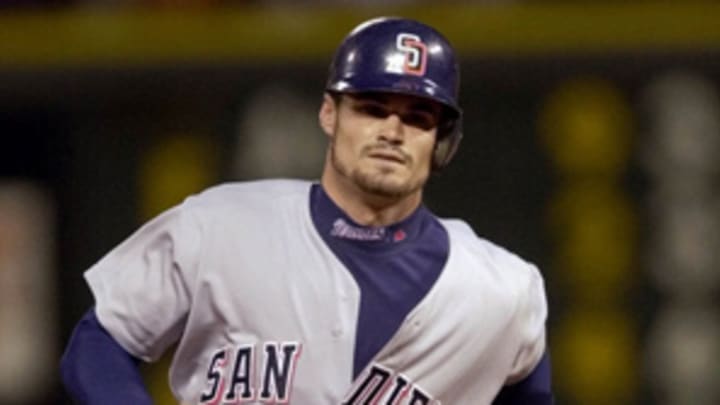Davis reinvents himself as pitcher

Five. Hundred. Dollars. That's the way Ben Davis states it, allowing the numbers to have their own space to linger. Though I am speaking with the ballplayer via phone, I can all but see his head shaking at the memory. The money. The lifestyle. The entitlements. He is now a married father of three, living in West Chester, Pa., trying to hold onto a dream while also providing food for his family.
"Man, I would love to have that $500 back," he says. "Man ..."
Back when he was at the top of the heap, a hot-stuff catcher who had been selected by the San Diego Padres with the second pick of the 1995 amateur draft, Davis earned the reputation as a kid too cocky for his own good. He was handsome, well paid, highly touted and blessed with a Steve Bartkowski-esque throwing arm. "I hate to put any type of label on him," Kevin Towers, San Diego's general manager, said in 1999, "but I think Ben's the type of person, and has a chance to be the type of player, that could hopefully step into Tony Gwynn's shoes."
That was 11 years ago. Now there is no trace of cockiness. Not one trace. The Gwynn-Davis similarities still exist, in that both played for Padres, both know how to drive to the San Diego Zoo without a map and both have, eh, uh, eaten food. That's about it.
Six years removed from his last major league game, Davis is 33 years old and in the midst of an unlikely comeback. Like dozens upon dozens of ex-big leaguers, Davis finds himself toiling in the bushes, playing for the Camden (N.J.) Riversharks of the Independent Atlantic League.
Yet the fable isn't that simple. A perusal of Camden's roster shows three catchers -- Korey Feiner, Shea Harris and Raul Padron -- and one right-handed starter with dark hair, a low-90s fastball and an understanding that, once one tastes major league life, the flavor never fully leaves his palate.
In other words, Davis is trying to make it back -- as a pitcher.
"Why am I doing this?" Davis says, answering a question he's been asked hundreds of times. "Because I still think I have something to offer, and I still love the game. Maybe I'm naive and foolish, but I believe I can do this. I really do."
Davis debuted with the Padres at the end of the 1998 season, and by 2001 he was the team's starting catcher, with 11 home runs and 57 RBIs in 448 at-bats. Yet for all his defensive skills, he was -- to the shock of Padres brass -- a jarringly poor hitter, batting .239 that season after hitting .223 the year before. His star already fading, he was traded to Seattle in 2002 as an unexceptional part of a package that included Alex Arias and Wascar Serrano. By this point, the word was out all over the majors -- the Davis kid is an easy out. He batted .259 and .236 in two seasons as a Mariners backup, then .207 in his final big league year, split between the M's and White Sox.
"Cut and dry, I was gone from the major leagues because I stopped hitting," said Davis. "I felt lost at the plate, and the worse I did, the more lost I became. It was a very frustrating time, and it consumed my life. I would come home and ignore my wife, I lost all my confidence. It killed me."
In July 2008, having bounced around the minors to no avail, Davis hit bottom. He contacted Paul Motta, Delaware Community College's longtime baseball coach and a man with a knack for fixing -- and occasionally making -- pitchers. "I decided I wanted to try something different," Davis says. "I'd rarely pitched in my life, but I always had a strong arm. So I asked Paul if we could work a little."
The two met at a local field and began the process of transforming a catcher into a pitcher. Davis could hit 90 mph with his fastball, and there was some semblance of movement. But Motta taught Davis about release point and follow-through, about how a pitcher thinks and how a pitcher reads what's standing in front of him. By the end of the 2008 season Davis was a member of the RiverSharks, compiling a 3.00 ERA in six appearances.
"It was a huge confidence boost," he says. "Proof that I could do it."
Last year Davis found himself back in professional ball, signing with the Cincinnati Reds and closing for Class A Sarasota. During one game he felt a pop in his shoulder, and the next morning found he couldn't raise his right arm above his head. "The worst part was that after the game they told me I was being promoted to Double A," he says. "And I knew it wasn't going to happen."
Davis underwent surgery, and when no major league teams showed interest he returned to Camden. This season he is 2-5 with a 6.52 ERA. Two starts ago he allowed one hit over eight innings. Then, earlier this week, he was bombed by Somerset, giving up seven runs in 3 2/3 innings. "It's very up and down being a pitcher," he says. "I am enjoying myself, and I'm glad I'm doing this. But I still maintain there's nothing sweeter than hitting a double into the gap. It's the ultimate baseball thrill -- and I miss that feeling.
"I really do."
